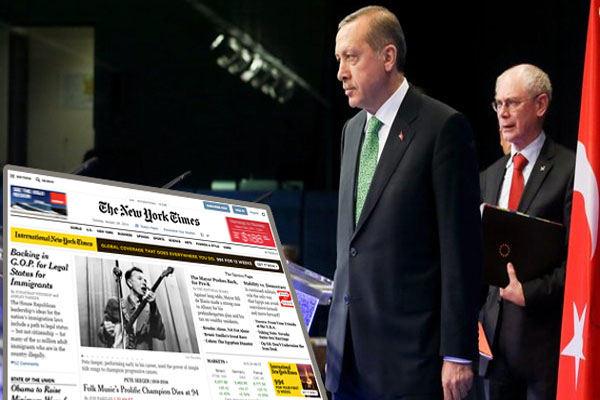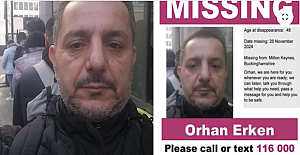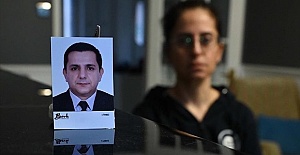Referring to controversial reforms and reshuffles made to the Turkish judiciary and police force in light of a series of anti-graft operations ordered by prosecutors against bureaucrats and businessmen close to Turkey’s ruling AK Party, the New York times accused Prime Minister Erdogan of creating a ‘political disaster.’ While praising Turkey for its strides towards democratization of state systems, which has largely been achieved during Erdogan’s 11 year reign as Turkish premier, the New York Times said that Erdogan had transformed Turkey into an ‘authoritarian state.’
The Editorial Board, who published the condemnation of Erdogan on Monday, called his tactics against the Turkish opposition ‘ruthless’ and described the crackdown against Gezi Park rioters last June as an ‘attempt to crush dissent.’
Quoting Germany’s foreign minister Frank-Walter Steinmeier in saying that Europeans should demand that Turkey returns to the ‘rule of law’, the New York Times stated that Erdogan’s policies threatened to derail Turkey’s membership talks with the European Union and destabilize NATO.
Furthermore, the New York Times also claimed that Turkey posed a ‘danger’ to NATO and the United States, urging US president Barack Obama’s administration to ‘send a strong message’ to Erdogan.
Erdogan, who has won three back-to-back democratic elections to remain Turkey’s Prime Minister since 2003, threatened to expel the US ambassador to Turkey after implying that the US had a hand in the December 17 police raids which also saw the arrest of the general manager of Turkey’s state-owned Halkbank on charges of breaching international sanctions on Iran.
The arrest came after US-based pro-Israeli lobby AIPAC pressured US congressmen to write letters to the US treasury and foreign ministry, calling for action on Halkbank.
The Turkish leader then pointed the finger at former ally Fethullah Gulen, who runs Turkey’s most influential lobby – the Hizmet Movement – from his home in Pennsylvania, USA.
Gulen, who the New York Times described as a ‘moderate’ Islamic scholar, has a number of followers in influential positions in the Turkish judiciary and police force who have been accused of carrying out the operations and setting up a ‘parallel state’ to undermine the legitimate government in a ‘post-modern coup’ attempt ahead of local elections in March.


 After Nesil Caliskan a by-election will be held in Jubilee ward in Enfield
After Nesil Caliskan a by-election will be held in Jubilee ward in Enfield Publishing the analysis, Labour’s Cllr Ergin Erbil said Everybody in Enfield deserves basic rights
Publishing the analysis, Labour’s Cllr Ergin Erbil said Everybody in Enfield deserves basic rights Gaza-Israel conflict Statement from Cllr Ergin Erbil, Leader of Enfield Council
Gaza-Israel conflict Statement from Cllr Ergin Erbil, Leader of Enfield Council Cllr Ergin Erbil was elected as the new Leader of Enfield Council
Cllr Ergin Erbil was elected as the new Leader of Enfield Council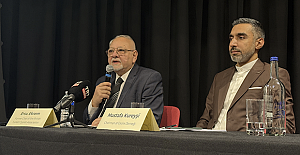 History of the Turkish Cypriot People symposium held in London
History of the Turkish Cypriot People symposium held in London Asia's most famous and powerful 100 women award given to WFPA President Naziya Bisenova
Asia's most famous and powerful 100 women award given to WFPA President Naziya Bisenova Death toll climbs to 5 as powerful Storm Bert batters Britain
Death toll climbs to 5 as powerful Storm Bert batters Britain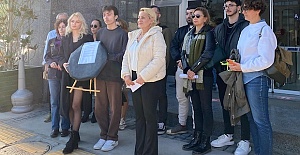 Turkish students are unable to obtain visas from the Italian Consulates
Turkish students are unable to obtain visas from the Italian Consulates Footballers are celebrating after Enfield Council officially opened a pitch
Footballers are celebrating after Enfield Council officially opened a pitch  Pep Guardiola's Manchester City beaten by Juventus
Pep Guardiola's Manchester City beaten by Juventus Chelsea to meet Arsenal in Sunday's London derby
Chelsea to meet Arsenal in Sunday's London derby Fenerbahce vs Manchester United Predicted line-ups! Jose Mourinho faces former side
Fenerbahce vs Manchester United Predicted line-ups! Jose Mourinho faces former side UK economy had zero growth between July and September
UK economy had zero growth between July and September Shape the future of housing services with The Enfield 500
Shape the future of housing services with The Enfield 500 DOUBLE-CAB PICKUPS TO BE CLASSED AS CARS UNDER NEW HMRC POLICY
DOUBLE-CAB PICKUPS TO BE CLASSED AS CARS UNDER NEW HMRC POLICY Guide to Selling Hoodies with Imprinted Book Quotes
Guide to Selling Hoodies with Imprinted Book Quotes





